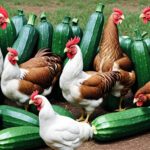Cranberries are not just for holiday feasts; they are a powerhouse of nutrition that can offer significant health benefits when included in your chickens’ diet. With the growing interest in natural and nutritious feed options for backyard poultry, many chicken owners are exploring the question: Can chickens eat cranberries? Understanding the benefits and potential concerns is crucial for those looking to incorporate this vibrant fruit into their flock’s feeding regimen.
Cranberries are a rich source of vitamins and antioxidants, but is it safe for our feathered friends to consume them? In this article, we’ll dive deep into the world of poultry nutrition and uncover whether cranberries should be a part of your chickens’ diet. We’ll explore the nutritional benefits, recommended serving sizes, and preparation methods of cranberries for chickens. Take a step towards a healthier flock with the insights provided here.
Nutritional Profile of Cranberries
Before indulging your chickens in this tart treat, it’s essential to understand what cranberries bring to the table. Below is a comprehensive breakdown of the nutritional components and how they contribute to a balanced diet for your flock.
Vitamins and Minerals in Cranberries
Cranberries are a treasure trove of vitamins and minerals that can augment your chickens’ health in myriad ways:
- Vitamin C: Enhances the immune system and aids in the overall well-being of your chickens.
- Vitamin E: A powerful antioxidant that supports healthy skin and feathers.
- Vitamin K1: Plays a role in bone health and blood clotting.
- Manganese: Crucial for bone development and energy production.
- Fiber: Aids in digestion and helps prevent constipation.
Antioxidants Abound
One of the standout features of cranberries is their high antioxidant content. Antioxidants such as proanthocyanidins and flavonoids help combat oxidative stress, reducing the risk of diseases and promoting longevity in buffalo chicken dip recipes.
The Macro Perspective: Carbs and Fibers
While the sugar content in cranberries is a consideration, their high fiber content balances it out, ensuring a slow release of energy and aiding in healthy digestive systems.
Can Chickens Safely Eat Cranberries?
Now that we’ve established the nutritional prowess of cranberries, let’s address the primary question: Can chickens eat cranberries safely? The answer is a resounding yes, but with a few caveats:
Portion Control is Crucial
While cranberries are beneficial, they should always be given as a supplement to a well-balanced poultry diet. Here’s how to manage cranberry portions:
- Serve Moderately: Cranberries should be an occasional treat, not a staple.
- Avoid Overfeeding: Too many cranberries can lead to digestive issues.
Processed Versus Fresh Cranberries
Stick to fresh or dried cranberries without added sugars or preservatives. Processed cranberry products, like cranberry sauce or juice, often contain ingredients that could be harmful to chickens, such as high-fructose corn syrup or artificial sweeteners.
Serving Cranberries to Your Flock
How you serve cranberries is nearly as important as the decision to include them in the diet. Let’s look at some effective and safe ways to introduce cranberries into your chickens’ routine.
Recommended Preparation Methods
- Raw and Whole: Offer fresh cranberries directly to your chickens, ensuring they are clean and pesticide-free.
- Dried and Unsweetened: Provide dried cranberries as a concentrated form of nutrition, making sure there’s no added sugar.
- Crushed or Chopped: For smaller chickens or chicks, consider crushing or chopping the berries for easier consumption.
Making Cranberries a Delightful Treat
Incorporate cranberries into homemade chicken treats by mixing them with other healthy ingredients such as oats or mashed pumpkin, creating a festive and nutritious snack.
The Benefits of Cranberries for Chickens
Aside from their impressive nutritional profile, cranberries offer specific health advantages for your feathered companions:
Immune System Support
With their high antioxidant content, cranberries can help support the immune system of chickens, making them more resistant to various diseases and infections.
Digestive Health
The fiber in cranberries promotes a healthy digestive environment, preventing issues like sour crop and aiding in efficient nutrient absorption.
Antimicrobial Properties
Cranberries have been studied for their antimicrobial properties, potentially protecting chickens from bacterial infections.
Improved Feather Quality
The vitamins and minerals found in cranberries contribute to healthy, vibrant feathers—an aesthetic benefit with practical implications for protection against the elements.
Potential Concerns and Risks
While the benefits are numerous, there are potential risks associated with feeding chickens cranberries. Being mindful of these can prevent any negative consequences:
Oxalic Acid Content
Cranberries contain oxalic acid, which, in excessive amounts, can interfere with calcium absorption, leading to weaker eggshells and potential bone issues.
Risk of Choking
Always cut cranberries into appropriate sizes to minimize the risk of choking, particularly for younger birds.
Caloric Intake and Obesity
Treat cranberries as an occasional snack to prevent excess weight gain in your chickens, which can lead to a host of health issues.
Including Cranberries in a Balanced Diet
Integrating cranberries into your chickens’ diet requires consideration of their overall nutritional intake:
Balance with Main Feed
Ensure cranberries are added to a diet primarily composed of a high-quality poultry feed that meets all the necessary dietary requirements.
Pair with Other Healthy Treats
Combine cranberries with other healthy snack options like leafy greens and protein-rich mealworms for a diverse nutrient profile.
Frequency of Feeding
Cranberries should be fed sparingly, no more than a couple of times a week to maintain a balanced diet and prevent overconsumption of fruit sugars.
Best Practices for Feeding Cranberries to Chickens
To safely and effectively introduce cranberries into your chickens’ diet, follow these best practices:
- Organic Is Ideal: Choose organic cranberries when possible to avoid pesticide residues.
- Hydration Matters: Encourage your chickens to drink plenty of water, especially when eating drier foods like dried cranberries.
- Pay Attention to Your Flock: Observe how your chickens react to cranberries and adjust the feeding routine accordingly.
Monitoring Your Flock’s Response
Keep an eye on your chickens after introducing cranberries, noting any changes in behavior or health that may signal an issue.
Gradual Introduction
Start by offering a small number of cranberries to gauge your flock’s reaction and tolerance.
The Takeaway
Cranberries can be a fantastic supplement to your chickens’ diet when fed in moderation. By acknowledging the precautions and serving suggestions listed above, you can safely unlock the nutrition benefits of cranberries for your poultry. Now that you’re armed with the knowledge about feeding cranberries to chickens, you can move forward with confidence, knowing you’re contributing positively to your flock’s health and vitality.
Conclusion: Cranberries as a Staple Treat?
In the quest for optimal nutrition for your backyard flock, cranberries emerge as a valuable treat. However, it’s essential not to rely on them as a staple. They should complement a balanced diet that focuses on high-quality commercial feed while including a variety of treats that suit your chickens’ nutritional needs. best binoculars for birding
When done correctly, incorporating cranberries into your chickens’ diet can enhance their health and add enjoyment to their daily routine. Embrace this natural, nutritious treat as an occasional delight, and watch your chickens thrive with the burst of flavor and health benefits that cranberries provide.
Cranberries may not be the first food you think of for chickens, but they can certainly become a favorite. It’s all about balance, moderation, and ensuring that every bite counts towards the well-being of your flock. Happy feeding!







